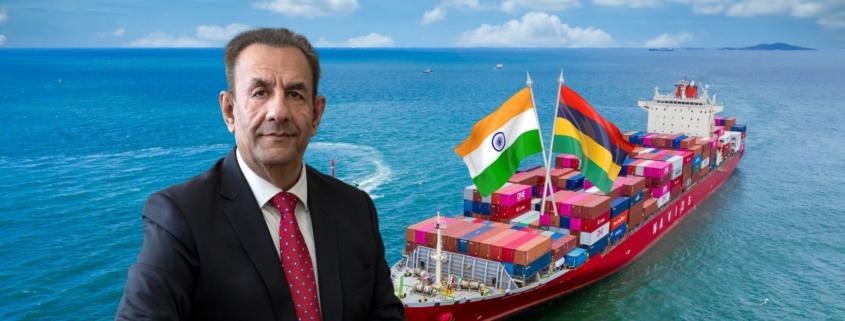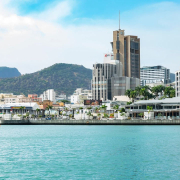India-Africa Trade is Booming — Here’s Why Mauritius is the Smartest Gateway for International Traders
As trade ties between India and Africa continue to deepen, international traders are increasingly seeking robust, tax-efficient platforms to structure and expand their cross-border businesses.
The External Affairs Minister of India, Dr S. Jaishankar, addressed the Japan-India-Africa Business Forum in February 2025 and said that India is Africa’s fourth-largest trading partner, with bilateral trade reaching nearly 100 billion dollars. A consistent rise in exports and imports between countries like India and South Africa is expected and the opportunities for growth are immense — but so are the complexities!
Africa, despite being a treasure trove of opportunities, still faces logistical inefficiencies, regulatory hurdles, and infrastructure limitations that increase trade costs. Mauritius — strategically located between India and Africa — is uniquely positioned to simplify and facilitate this growth.
Mauritius: A Strategic Hub for International Traders
Mauritius offers more than just geographic advantage. It is party to several trade agreements, including the Comprehensive Economic Cooperation and Partnership Agreement (CECPA) with India, is a ratified member of the African Continental Free Trade Area (AfCFTA) and a member of COMESA & SADC. These agreements provide Mauritius-based companies with preferential access to both Indian and African markets and opens the door to a huge market both in India and on the African continent.
An increase in tariff by the US could have a positive impact on trade between India and Africa. It may create opportunities for India and Africa to strengthen their bilateral trade ties, as the US may become less competitive in certain markets.
But there is another perhaps lesser known but highly beneficial reason why the Mauritius IFC is the ideal platform to conduct an international trading business activity and it is indeed a real game-changer, if approached smartly!
Under Mauritius law, companies engaged in “Export of Goods” benefit from a corporate tax rate of just 3% resulting in tax savings, improved cash flow, and better negotiation power.
What Qualifies as ‘Export of Goods’ Under Mauritius Law?
According to the Mauritius Income Tax Act, Export of Goods includes the international buying and selling of goods in the company’s own name, where goods are shipped directly from the original exporting country to the final importing country without physically landing in Mauritius.
No need for warehousing or transshipment through Mauritius — the key requirement is that the company legally executes the transaction in its own name.
The Tax Advantage: 3% vs. 15%
Companies that engage solely in export of goods are taxed at just 3%.
If a company is involved in multiple business activities, only the portion of income attributable to export of goods is taxed at 3%, while the rest is subject to the standard 15% rate, using an apportionment formula.
A 2023 income tax ruling (TR 262) by the Mauritius Revenue Authority (“MRA”) clarifies that the apportionment method should consider the total chargeable income and not just the portion attributable to export activities. Care should also be taken to avoid mixing exempt income or capital income in gross income to avoid incorrect computations.
Tax Ruling in Focus: Export Requires Substance
Another 2023 MRA Tax Ruling (TR 265), while not clearly identifying the reasons for denial of the tax rate of 3%, does appear to illustrate an important point. A company claimed to be exporting fish but lacked operational control & substance (no vessels, no export license in its name). The MRA ruled it ineligible for the 3% tax rate, reinforcing the principle that the export must be executed in the company’s own name.
There is indeed a need for proper structuring of the Export of Goods activity and the idea of carrying out the business activity using an off-the-shelf GBC (i.e without careful structuring) may prove to be counter intuitive and costly! Talk to an expert like GWMS to avoid unpleasant surprises!
Why Set Up a GBC in Mauritius?
A non-citizen of Mauritius owning a majority of the shares of a Mauritius company which intends to carry out the majority of its business outside of Mauritius is required, by law, to set up a Global Business Company (GBC). An Authorised Company may also be considered in some cases.
Here’s some significant reasons why a GBC is the ideal vehicle for Indian, African or any other international traders, amongst others, for the Export of Goods activity:
- Access to 49 double tax avoidance treaties and 30 investment protection agreements
- 3% tax rate for qualifying Export of Goods activities, meaning higher retained profits for reinvestment or expansion.
- With more liquidity, the GBC can place larger orders, securing volume discounts.
- Improved cash flow provides the opportunity to negotiate extended payment terms with suppliers while offering quicker payments when needed (improving trust).
- Reputational jurisdiction with strong AML/CFT frameworks and robust regulatory oversight
- No capital gains tax, no withholding tax on dividends, and tax credits available
- Ability to conduct international trade without requiring physical transit of goods through Mauritius
- Strategic support from a licensed Management Company for compliance, banking, tax planning, logistical support and operational setup
- A GBC is a licenced entity subject to the compliance framework of Mauritius. This undeniably improves perception among international suppliers and banks, making it easier to do business, open multi-currency accounts, secure trade financing and better access to international payment gateways
Moving Beyond the Checklist: Applying a True Risk-Based Approach (“RBA”) in Mauritius – a Game Changer to onboard your suppliers swiftly!
Mauritius has adopted an RBA to Anti-Money Laundering and Countering the Financing of Terrorism (AML/CFT), in line with international standards. This framework requires that due diligence efforts—particularly those relating to Customer Due Diligence (CDD) and Know Your Customer (KYC)—be proportionate to the risks posed by individual customers, transactions, or relationships.
The level of CDD required depends on the risk associated with the customer. Generally, there are three tiers of CDD:
- Simplified Due Diligence: Simplified Due Diligence is applied in situations where the risk of financial crimes is considered low. Therefore minimal customer information and verification may be possible.
- Standard Due Diligence: This is the most common level of CDD and applies to most customers. It involves a thorough assessment of the customer’s identity, business activities, and financial situation.
- Enhanced Due Diligence: This level is applied to high-risk customers or those involved in complex or unusual transactions. It requires more stringent checks and a deeper investigation into the customer’s background, including the source of funds and the purpose of the transaction as well as ongoing monitoring.
However, in practice, many advisors and service providers struggle to apply this RBA principle effectively. Due to a lack of expertise, understanding, or comfort with regulatory frameworks, a “one-size-fits-all” checklist approach is often adopted. This results in uniform and sometimes overly burdensome compliance procedures being applied to all clients and counterparties—regardless of their actual risk profile.
For instance, listed suppliers, long-standing institutional clients, or reputable suppliers may be subjected to the same level of documentation and verification as lesser-known or higher-risk clients. This not only ignores the core tenets of the RBA methodology but also leads to unnecessarily tedious KYC vetting processes. The unintended consequence is a disruption in the ease of doing business—one of Mauritius’ key competitive advantages as an International Financial Centre.
At GWMS Ltd, we apply a rigorous but intelligent risk-based approach to CDD and KYC. Our team is well-versed in the nuances of the AML/CFT framework and takes a practical view that satisfies both the letter and spirit of the law. We believe in tailoring due diligence requirements to the actual risk presented by a client or transaction, ensuring that our procedures are robust without being obstructive. This enables our clients—and their clients or suppliers—to conduct their business in a secure, compliant, and efficient manner.
Our approach balances compliance and business facilitation, aligning with Mauritius’ vision of being a trusted and attractive jurisdiction for international trading & investment.
Let’s Build Your Global Trading Structure Together!
At GWMS Ltd, we specialise in helping our clients including Indian and African clients structure their cross-border businesses using Mauritius as a trusted platform. From GBC formation and bank account setup to regulatory compliance, tax planning, and ongoing administration, our team ensures a smooth and efficient launch of your international trading operation.
Whether you’re in commodities, pharmaceuticals, logistics, electronics, or any other trading vertical, we’re ready to assist you do business seamlessly and expand — strategically and compliantly.
Reach out to us today to explore how we can assist in structuring your trading business in Mauritius.
Let Mauritius be your launchpad. Let GWMS be your advisor. Peace of mind is part of the deal!



















Leave a Reply
Want to join the discussion?Feel free to contribute!